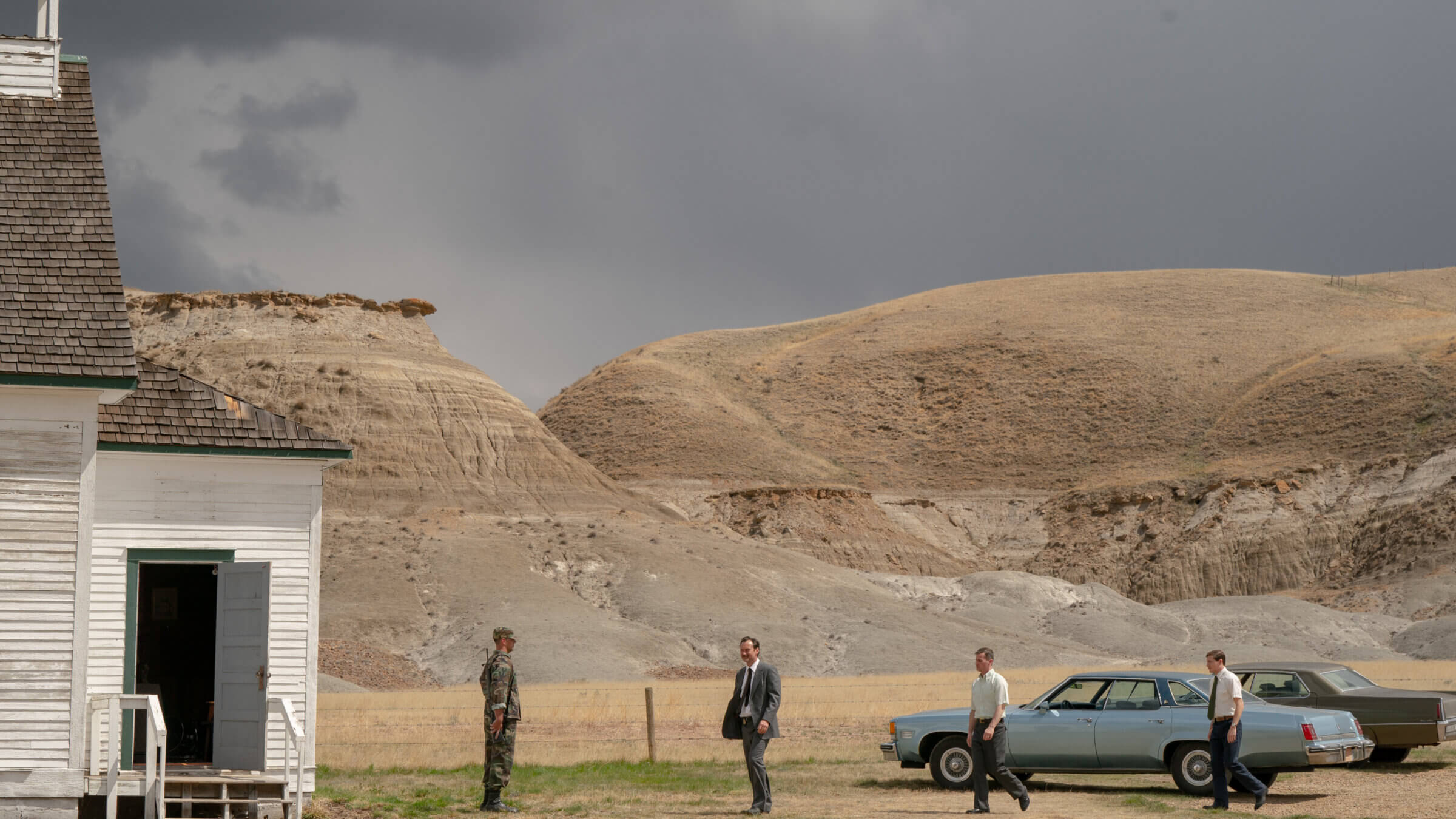In ‘The Order,’ Jude Law enters the heart of white nationalist darkness
The taut thriller tells the true story of a plot to ignite a race war

Jude Law visits a white power compound in The Order. Courtesy of Vertical
The first thing you hear in The Order, a propulsive thriller about a white power group’s plans to spark a race war, is a discussion of blood libel.
“You were saying Jews use the blood of Christian babies,” says Marc Maron, playing Denver radio personality Alan Berg. At first Berg jokes along, asking his caller if Jews use the blood as a condiment or gravy. When the antisemite on the line calls him a kike, Berg hangs up the phone.
The call wasn’t something to laugh off. Berg, in the film as in life, said those jeering at him during his show saw Jews as “some mythological thing” to fault for their problems. To them, “the only really good Jew is a dead Jew.”
The words were prophetic: A splinter group of the Aryan Nations would murder Berg in his driveway on June 18, 1984, a short time after he avowed on air his belief that people, though disaffected, are fundamentally decent.
Helmed by Australian director Justin Kurzel, The Order is about the titular terror cell who slew Berg, robbed banks and Brinks trucks and planted bombs outside synagogues and porn stores throughout the 1980s in the Pacific Northwest.
The string of robberies leads FBI agent Terry Husk, a mustachioed, nose bleed-prone Jude Law, to uncover the extremist group, paying visits to scenic compounds with barn roofs painted with swastikas and children sieg heil-ing from playground equipment.
The Order, we learn, went rogue, unwilling to wait for their ideology of white supremacy to gain “members in the Congress, the Senate” as neo-Nazi preacher Richard Butler advocated.
Led by Bob Matthews (Nicholas Hoult), the group is using The Turner Diaries, the 1978 neo-Nazi novel, as a blueprint for amassing funds to build an army and upend the government by seizing the Capitol and hanging race traitors. (These mentions are none too subtle — as a coda before the credits notes, The Turner Diaries played a similar role in the Jan. 6 insurrection.)
Kurzel, staging some Michael Mann-worthy shootouts, is approaching the material, scripted by King Richard writer Zach Baylin and based on the nonfiction book The Silent Brotherhood, with a sense of dour responsibility. There’s a palpable concern for the revival of the militia movement and the racial animus that animates it.
But the film falls short in demonstrating the roots of this discontent, and why the response so often falls back into patterns of bigotry. Matthews, at a gathering of the Aryan Nations, may speak of how the men have lost their jobs, dignity and country, but the words feel more like slogans than anything demonstrated on screen. We’re told the problems that fuel this reactionary hate, but engage shockingly little with their reality.
Of course this is partially by design. To show white supremacists as properly aggrieved would risk legitimizing their narrative, which blames all the wrong actors for their predicament. Instead of indulging them, Kurzel sets the racists against an interracial family (Tye Sheridan as a young policeman and Morgan Holstrom as his wife) and a Black FBI agent (Jurnee Smollett) standing in for an inclusive vision of America, at odds with Matthews’ white American birthright.
In being short on direct commentary (Ronald Reagan’s portrait — that godhead of trickle down policy who sought to end affirmative action — looms in the background of a field office) The Order risks minimizing the factors that furnished our current nativist moment, and the growing appeal of militarism beyond the usual, racially resentful suspects. The film takes the threat of groups like the Order seriously, but not the conditions that give rise to them.
In the words of Berg — a martyred saint here, striking a stark contrast with Eric Bogosian’s fictionalization in Talk Radio — “you have to have someone to blame for your life.”
For the angry white man, the blame has traditionally fallen to minorities. Yet to address that scapegoating — and not who benefits from it — is to dismiss a clear and present danger as inexplicable and, worse still, useless to resist.
A message from our CEO & publisher Rachel Fishman Feddersen
I hope you appreciated this article. Before you go, I’d like to ask you to please support the Forward’s award-winning, nonprofit journalism during this critical time.
We’ve set a goal to raise $260,000 by December 31. That’s an ambitious goal, but one that will give us the resources we need to invest in the high quality news, opinion, analysis and cultural coverage that isn’t available anywhere else.
If you feel inspired to make an impact, now is the time to give something back. Join us as a member at your most generous level.
— Rachel Fishman Feddersen, Publisher and CEO